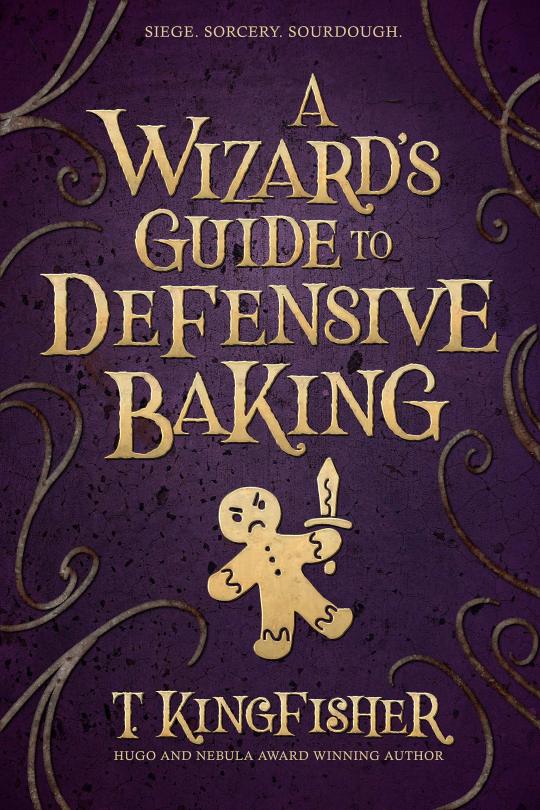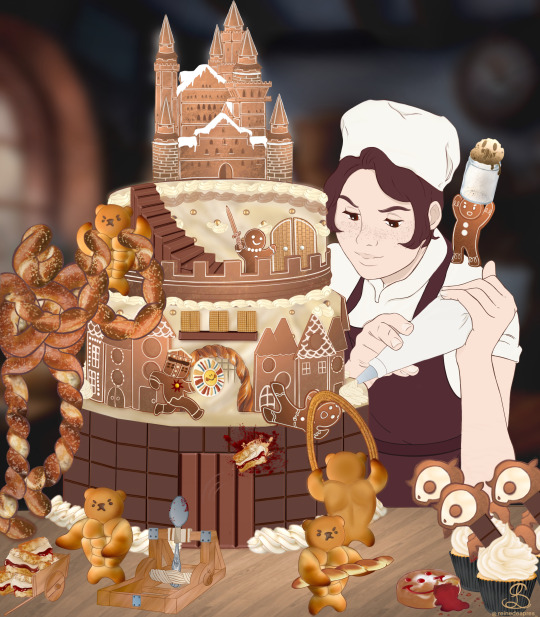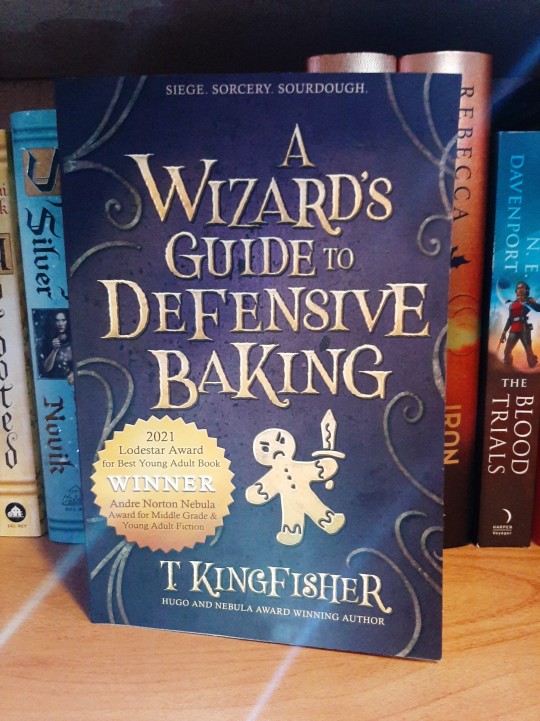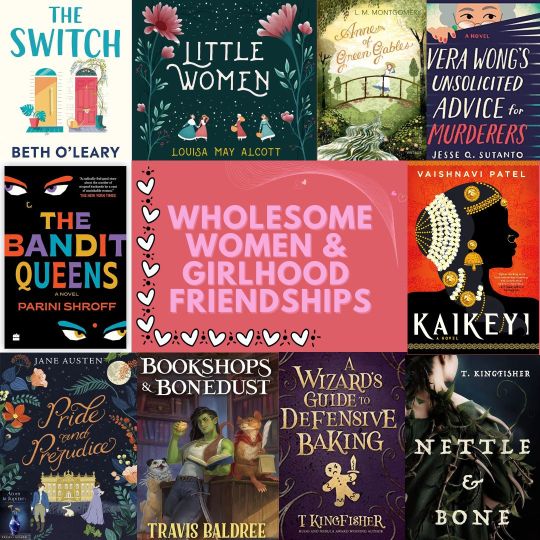#a wizard’s guide to defensive baking
Text
I would die for Bob the magical sourdough starter

17 notes
·
View notes
Text
A Wizard’s Guide to Defensive Baking - Review

It's always a delightful surprise when you enter a book with low expectations, based on the negative opinion of others, only to find yourself utterly engrossed in its pages. This was my experience with the book in question. A fellow member of my book club had voiced a strong distaste for the book, leading me to believe that it might fall short of my expectations. This was a concern, particularly because the first book we had read for the book club, in my opinion, was a letdown. However, I was pleasantly surprised to find that, barring one chapter that felt unnecessary, the rest of the book was thoroughly engaging and entertaining.
Unlike some books that keep the suspense simmering until the later chapters (like, nothing happening even when you've read 60% of it), this book plunges you into the heart of the action right from the get-go. Mona, the protagonist, stumbles upon a dead body in the very first line, setting the tone for the story to come. We're off to a good start!
There's been some criticism about the inconsistency in Mona's character, especially around the fact she's 14 years old. However, I beg to differ. Sure, there was one instance where her reaction seemed slightly immature for her age. Still, it's essential to bear in mind that Mona's upbringing and lack of formal education set her apart from the typical depiction of 14-year-olds in media that most of us have been exposed to. It's also worth noting that people, particularly teenagers, are not always as predictable or consistent as we might expect. Mona's character, in fact, brought to my mind another famous 14-year-old, Usagi Tsukino, also known as Sailor Moon. Despite being known for being a crybaby, Usagi always rises to the occasion when duty calls (sometimes begrudgingly). In a similar vein, Mona, although gripped by fear, chooses to do the right thing despite the potential risks.
The magic in the book is also refreshingly unique. It's not the grand, world-altering kind; instead, it's centred around something as mundane as baking. The creativity and humour with which the author weaves this baking magic into the plot are truly commendable. And who doesn’t love a sassy gingerbread man? However, I found it odd that many reviews focused on Bob, who barely features, rather than the gingerbread man. Despite being clearly inspired by the gingerbread man in Shrek, he is, in my opinion, the story's highlight.
Although I seem to be the only person in my book club to have enjoyed this book (and, apparently, the only one to dislike the first one), I recommend it. While it's not a literary masterpiece, it's fun, lighthearted, and features a sassy gingerbread man.
3 notes
·
View notes
Text
“Well... I have this... thing". Saying I have a homicidal sourdough starter sounded much too bizarre.”
― T. Kingfisher, A Wizard’s Guide to Defensive Baking
0 notes
Text
A Wizard’s Guide to Defensive Baking by T. Kingfisher
Look, I had to read this eventually. Had heard great stuff about the author, and like, baking wizardry? What else could I want from a book? Turns out, not much.
It’s a short book, so this’ll be a short review. I didn’t realize going in, but this is a middle grade novel. Not a bad thing, but I ought to check, and I figured I would give a heads-up there to whoever needs it. I had gotten it into my head to expect a more cozy pastry shoppe type thing, but that’s neither here nor there.
The book focuses on Mona, a 14-year-old bread wizard and employee of a bakery run by her aunt. She’s starts the dough one morning and finds a dead body in the kitchen, which leads her getting entwined in a plot to kill all the wizards in her city. The strongest point of the story is the characters, who are so dearly human. They aren’t the typical heroes or villains (mostly) but they are so very alive, which is reason enough for me to recommend it to anyone who wants some fluff with a little bit of (alright, by the end a fair bit of) violence.
Being middle grade, it does suffer from much of the same issues that those books tend to, a lack of depth to the story and somewhat strange choices for the plot and characters (I remember being 14, and people just aren’t really like that). Some of the scenes are a little sudden, and the geometry of the city is more than a little confusing to me, but it doesn’t actually matter too much (silly books get a small pass for this). If nothing else, you should read it for Knackering Molly, the insane dead horse wizard. She’s wonderful. Happy Reading!
1 note
·
View note
Text
A Wizard’s Guide to Defensive Baking - T. Kingfisher
My main nitpick with this book is that Mona doesn’t act 14, but more like a Late-Teen that’s lived a semi-sheltered life. Making her younger, and having to constantly remind us of this, feels more like a gimmick. If she were an adult, we’d feel less sympathy towards her and expect her to be more self sufficient. Which she tends to do anyways, and then bemoan that there isn’t an “adult” around to help her out.
Writing around some of her “helplessness” by making her a child (that doesn’t act like a child) instead of a young woman to avoid some kind of bias.... ehhhh.
1 note
·
View note
Text
Book Review: “A Wizard’s Guide to Defensive Baking” by T. Kingfisher
“A Wizard’s Guide to Defensive Baking” by T. Kingfisher (2020)
Genre: YA, Fantasy, Fiction
Page Length: 308 paperback (paperback edition)
Synopsis:
Fourteen-year-old Mona isn’t like the wizards charged with defending the city. She can’t control lightning or speak to water. Her familiar is a sourdough starter and her magic only works on bread. She has a comfortable life in her aunt’s bakery…

View On WordPress
1 note
·
View note
Text

Current read. So good so far. I expect nothing less from Kingfisher.
109 notes
·
View notes
Text

vote yes if you have finished the entire book.
vote no if you have not finished the entire book.
(faq · submit a book)
42 notes
·
View notes
Text
ADHD and quitting: there’s also a good sense!
It took decades. Not years. Decades.
Us ADHDers DNF (= do not finish) so many things, that even leaving a book that doesn’t click with us ends up feeling like a failure: here’s another thing I started and will never finish.
After decades of forcing myself through books I did not connect with so as not to “quit”, I realized I’ve been wrong all this time.
A better, more correct way to look at this is - here’s me re-evaluating and realizing that this specific effort is simply not worth it!
Today I quit reading Terry Pratchett’s “The Colour of Magic” a third way in. Not because it wasn’t good, not because I’m a bad reader, and certainly not because I’m a failure.
The book is funny and cool, but at the moment I need characters to deeply connect with. This is not that kind of book.
Glad I realized this was the reason for my very slow advancement with it!
As a farewell to Pratchett, here’s a quote that seems like a description of the path of an ADHD thought: 😁

“In his somewhat defenceless state a stray thought, wandering through the dimensions in search of a mind to harbour it, slid into his brain.”
Starting T. Kingfisher’s “A Wizard’s Guide to Defensive Baking” now!
#adhd#adhd and reading#reading with adhd#booklr#book quote#terry pratchett#the colour of magic#t kingfisher#a wizard's guide to defensive baking#actually adhd#adhd brain#adhd community#fantasy#fantasy fiction#bookish#book quotes#bookblr#adhd feels#adhd life#adhd tips
119 notes
·
View notes
Text
So, unlike some more enlightened people in the world, I just discovered T. Kingfisher/Ursula Vernon in 2021, and I can't believe how much I was missing.
I've read, I think, seven of her books now, and every one has been so well done. How can this woman write fantasy, horror, humor, romance, steampunk, fairy tale retellings, classic literature retellings, books for adults, books for teens, books for children, and often three to five of the above genres at once, and all of them are so good?
I've seen some of her work classified as cozy, which is kind of funny when you read a few of her books (they're anything but low stakes), but she has such a way of infusing every story with so much warmth and humor and love that I can understand why people say her writing is cozy.
This woman really wrote a book about a sister on a quest for revenge against the prince that has been systemically abusing and murdering her sisters (while she shares the road with a witch, a demon, a bone dog, a dude who recently escaped faerie enslavement, and a failed fairy godmother), and the book was both heartwarming and hilarious while breaching really difficult topics.
And the best part of all of this is that T. Kingfisher does all this, more often than not, in like 200ish pages.
But also, I just bought Swordheart and Paladin's Grace, and I'm really excited to see for the first time what she does with a book that's more than 300 pages.
#t. kingfisher#ursula vernon#nettle and bone#books#Clocktaur war#clockwork boys#The wonder engine#a house with good bones#what moves the dead#nettle & bone#A wizard's guide to defensive baking#thornhedge
68 notes
·
View notes
Text
I'm reading "A Wizard's Guide to Defensive Baking" by T Kingfisher and it's WILD because you've got some really real and heavy hitting quotes like
"You expect heroes to survive terrible things. If you give them a medal, then you don't ever have to ask why the terrible thing happened in the first place. Or try to fix it. How else are you gonna have heroes?"
but also, a very major part of the plot is basically this scene from Shrek 2

#its a good book#i've been working my way through t kingfishers stuff lately and it absolutely slaps#a wizards guide to defensive baking#books#the stromboli speaks#shrek 2
97 notes
·
View notes
Text
Just finished "A Wizard's Guide to Defensive Baking" by T. Kingfisher. It's the one about a baker wizard who has a sourdough starter familiar that was mentioned on that one popular tumblr post, though honestly this one gingerbread man she made acts more like a familiar to her than Bob does.
Overall, I enjoyed it. I like how it showcased the ways people could make use of even fairly specific talents. A lot of wizards in this world could only really make one specific type of "thing" do what they want, whether it's bread (or really, anything created from dough) like Mona, or making dead horses walk, like Molly. So there's a lot of emphasis on working with what you can do, rather than worrying about what you can't, and not underestimating your abilities just because they seem silly and minor at first blush.
Anyway, basically, a dead girl's found in the bakery, Mona's called up to the palace as a suspect (she found the body), and is quickly found innocent and sent home. But over the next few days the magical folks in the city are all spooked, and there's efforts to make all mages register, and propaganda about how magical folks could be spies and traitors...
I don't want to go too much further into that so I don't spoil the rest of the story.
There's also this theme that crops up a lot during the second half of the book about "heroes", and how that term's often used to kind of make it okay that people had to suffer and die when, if other people had done their jobs properly, they wouldn't have had to. That it's great for Mona to have been able to accomplish what she did during this book, but that it shouldn't have been on a fourteen-year-old girl to begin with. I saw that sort of thing pop up a lot back in 2020 and 2021 with how nurses, doctors, and other essential staff were being hailed as "heroes" for working during such dangerous times, often with inadequate equipment, and then have it noted that afterwards, many of those same staff who were being hailed as heroes were still being underpaid.
There is one thing about the book that I really didn't like though. One of the main threats to the city Mona lives in is this group of mercenaries from some far away place, that apparently is cold and inhospitable. They got hired to help one city-state take out another, then decided they like these lands much better, and have just stuck around burning down fields, raiding and pillaging cities and taking all their stuff, and even eating people because apparently they're cannibals for some reason. At no point are they characterized as being more than some horrifically violent, evil, foreign mob who only exist to cause pain and suffering. Heck, even with their only job seemingly being fighting and killing, they're still characterized as selfish and unwilling to commit to battlefield tactics like overwhelming an enemy, when it would put the first few people at the front of the charge at risk, because they don't have the discipline of a regular army I guess.
I can see why it's useful to have some major threat like this, but whom you don't have to show any sympathy for or feel bad about being killed or injured, and who you don't have to try and have the leader negotiate with because they're so cruel and enjoy spreading pain and suffering so much, that there's no point. But the only reason it doesn't ping most people's "racism" radar is that their appearances are never described. But using this depiction of this group of people... honestly, it reminds me of "indigenous cannibals" and how that stereotype has been used in many movies, books, and tv shows to have the (white) protagonists be menaced by some group that's depicted as being ready to chop them up and eat them if caught, no questions asked. It's the same sort of narrative convenience being taken advantage of here, where you don't need to ask about negotiating or worry about the ethics of killing the invading army, because they're dehumanized to such an extent that you just don't worry about it.
8 notes
·
View notes
Text
Things I'm loving about A Wizard's Guide to Defensive Baking as a middle-grade fantasy:
Not only is the "where were all the adults" question addressed, it's addressed through the protagonist asking it. And the question itself does double duty, since the asking of it in the first place makes a fantastic coming-of-age marker.
Very thoughtful use of magic as day-saver. Magic sometimes stands in in kids' books for the possession of some kind of virtue like pureness of heart or strongness of will. Here, the valued trait is basically "the creativity to work with what you've got to solve the problem at hand". Pratchettian in a way, but the particular twist to building skills and working the problem is so Vernon.
Really interesting found-siblings arc, in a way that underscores the value in that specific kind of relationship.
25 notes
·
View notes
Text

T. Kingfisher's work has some of the most creative and clever uses of magic in the game, you never know what to except going in besides the assurance that you'll have a good time.
A Wizard’s Guide to Defensive Baking is no exception, Mona and her gang of (often literally!) sweet friends were so endearing and the story was an absolute joy to lose myself in. Thank you @tkingfisher 🍰✨
88 notes
·
View notes
Text
And the Familiar was a Sourdough Starter

This is actually not a book I picked up, it was a book a friend who is very into baking loaned me. And let me just tell you, it was a DELIGHT from start to finish. There were baked goods, an aggressive sourdough starter, and so, so many gingerbread cookies. There were also excellent questions about what it is to be a hero, the limitations and failures of authority, and under what precise circumstances climbing up a garderobe becomes a viable option (spoiler alert: it's when there are literally no other options). Let's talk A Wizard's Guide to Defensive Baking.
There will Be SPOILERS below the break! Be warned!
Fourteen-year-old Mona is a baker first and foremost. If she sometimes can save overworked dough with magic or make a like of gingerbread men can-can, well thats just a thing she can do. She is a baker. Until, of course, a dead body shows up on the kitchen floor.
Dead bodies showing up randomly is just never, ever a good thing.
Its even less a good thing when a bougie, dickheaded wizard from the castle decides you did it, and because a whole lot of people at a whole lot of levels failed catastrophically in their job, you end up in the position of having to climb a garderrobe to galvanize a weak leader into not doing a magical racism. And then because EVEN MORE PEOPLE FAILED TO DO THEIR JOBS, you at 14 are the last wizard left to defend the city (which is currently sans army) against a bunch of mercenary raiders. Oh, and your magic is entirely bread-based.
I, much like Mona was, would have been royally pissed that I had to be a city-saving hero at 14 because the system and a bunch of key individuals failed that hard and it somehow got left to me. And that is possibly one of the best parts of this book, is that discussion that heroes rarely feel heroic, and then asks WHY. And the answer is almost always some variation on "because a bunch of other adults fucked up." And that sucks, and it's hard, and it's unfair, and all of that is acknowledged in story. But Mona still has to step up and BE that hero.
Thankfully, however, the book at least acknowledges that the 14-year-old should never have to make the sacrifice play. Knackering Molly, a deadass (pun fully intended) horse necromancer who was heavily implied to have been forcibly employed by and subsequently deeply traumatized by the army in her youth, steps up to make the sacrifice play to save the city that did her so dirty. And she does it not because it's heroic or even because it's the right thing to do, no. She does it because if she doesn't, then another wizard kid--of whom she is rather fond--would have to. It's not fair that Molly has to take that hit either, but she was a grown-ass adult who was capable of making that choice, and I love that she did it for Mona. If Mona hadn't been in the picture, I think Molly would have let the city fall without a second thought. And that might even have been the right choice.
Wrapped up in Mona's hard lesson in adults fucking up is a hard lesson about the fact that authority can be weak and corrupt, and it can and will use state actors (the "all cops are bad" energy of a couple of scenes in this book is legendary) to oppress and murder people without power or authority. It encourages questioning and holding authority figures accountable. And once the fight is over, it acknowledges that being given a butt-ton of awards and recognition doesn't make any of it ok. Mona is still angry at the Duchess after all is said and done, and that is very much framed as perfectly understandable and acceptable.
Now, while the politics and power brokering and coming into an adult understanding of how systems of authority work are really excellent parts of this book, they're not the only excellent bits. We have got to talk about the magic system.
People who hate soft magic systems should leave now, because the magic system in this book is softer than raw dough. There is no Sandersonian breath counting here. But I have always thought that magic systems shouldn't get in the way of a good story, and I like a good soft magic system. This one also goes back to basics with what they call sympathetic magic--basically, if you have a bit if a thing, you can command the rest of the thing (you might recognize this as thaumaturgy).
This works beautifully for baking magic, because you can do a LOT of this with dough. And Mona does, from little magics like saving overworked dough or stopping biscuits from burning to full on bad gingerbread men who sabotage the enemy and GIANT BREAD GOLEMS. Seriously, the magic and the baking works together with a natural synergy that just happens effortlessly. The gingerbread men are sassy and wonderful.
But of course I would be remiss if I didn't mention Bob the Sourdough Starter. Bob is...an accident, more or less, from when Mona panicked that she had killed her aunt's sourdough starter and threw magic at it. Bob was the result. Bob eats flour, sugar, odds and ends of baking, and the odd dead fish when nobody's looking. He also has definite opinions about people. Mona is the center of his world, and Spindle and Aunt Tabitha are acceptable. Uncle Albert gets growled at, and when Mona yeets Bob at the Spring Green Man during his attempted assassination of her, Bob burns the Spring Green Man like acid. Needless to say, when the city is besieged, they yeet chunks of Bob at the oncoming hordes and it is...disturbingly effective.
In this house, we stan Bob. From a safe distance and with a haddock I hand, if at all possible.
Overall, this book was a delight to read, and I'm a little sad I have to return it to one of my book buddies. Mona was a treat as a protagonist, the supporting cast was colorful and fun, and the stakes were realistically high. I highly recommend this treat of a book.
#a wizard's guide to defensive baking#middle grade fantasy#ya fantasy#bread magic#books and reading#books#books and novels#books & libraries#book recommendations#book review
11 notes
·
View notes
Text

Wholesome Women and Girlhood Friendships ❤️
“The Switch” by Beth O’Leary
“Little Women” by Louisa May Alcott
“Anne of Green Gables” by L. M. Montgomery
“Vera Wong’s Unsolicited Advice for Murderers” by Jesse Q. Sutanto
“The Bandit Queens” Parini Shroff
“Kaikeyi” by Vaishnavi Patel
“Pride and Prejudice” by Jane Austen
“Bookshops & Bonedust” by Travis Baldree
“A Wizard’s Guide to Defensive Baking” by T. Kingfisher
“Nettle & Bone” by T. Kingfisher
#girlhood#women friendships#women books#diverse books#diverse authors#women authors#The Switch#Beth O'leary#Little Women#louisa may alcott#Anne of Green Gables#l. m. montgomery#Vera Wong's Unsolicited Advice for Murderers#jesse q. sutanto#The Bandit Queens#Parini Shroff#Kaikeyi#vaishnavi patel#Pride and Prejudice#Jane Austen#A Wizard's Guide to Defensive Baking#T. Kingfisher#nettle and bone#Wholesome#Girlhood
10 notes
·
View notes